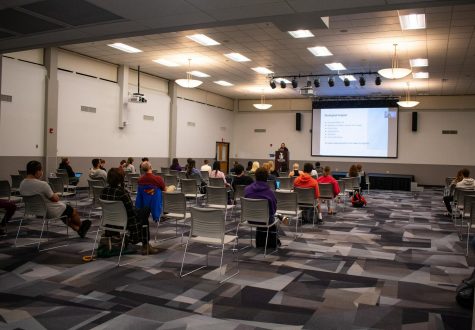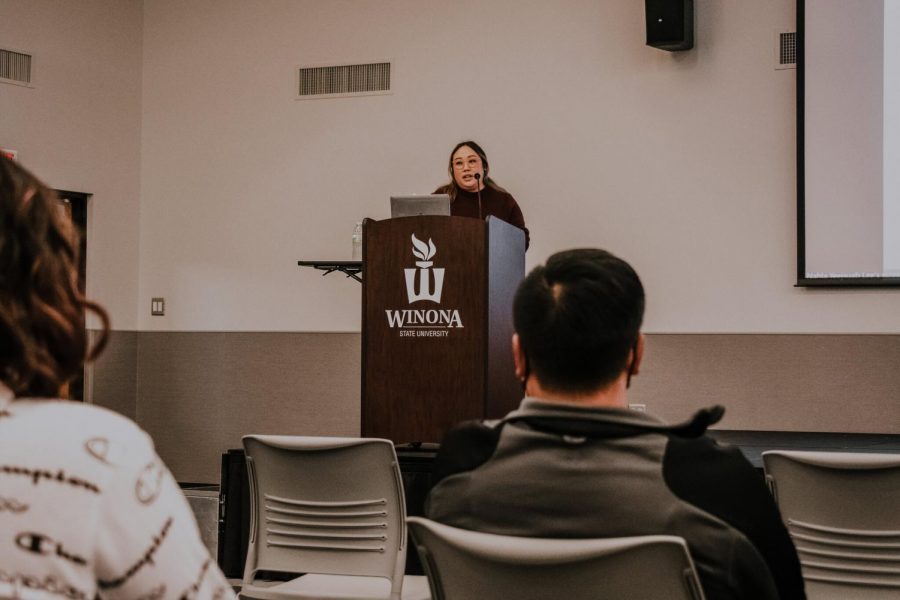WSU graduate returns to discuss racial battle fatigue
Jouapag Lee, the guest speaker of Oct. 13’s Expanding Perspectives series’ second event, pictured presenting in the Kryzsko Ballroom. Lee spoke about the encounter at Winona State that sparked her involvement in social justice, among other topics.
October 20, 2021
Winona State University’s Equity and Inclusive Excellence Office is now in their second year of putting on their Expanding Perspectives series, this past Wednesday, Oct. 13 having been their second series event of this school year.
Jouapag Lee, a 2014 Winona State graduate, was the guest speaker of Wednesday’s session. Lee’s presentation, scheduled from 7 to 8 p.m. in the newly remodeled Kryzsko Ballroom on the 13th, focused on racial battle fatigue. As an Asian American, first-generation college student and Winona State graduate, Lee gave insight into her personal experiences at Winona State regarding racial battle fatigue, trauma and stress.

The presentation began with a native land acknowledgement, which Lee pointed out was not something implemented during her years at the school and she was glad to see it now part of university events.
Lee began her presentation by speaking on the “critical time in university and politics” it was during her years at the university, as Barack Obama had just been elected as the first Black president in 2010, Lee’s first year of college and how she got involved in social justice work.
“Looking back, it feels too easy to say that I discovered my passion for social justice,” Lee said. “Because, really, at the time it felt less like passion and more like disorientation. I spent a lot of my time [at Winona State] learning, unlearning and relearning how I saw the world.”
Lee said her second year at Winona State is when “things really changed” for her regarding realizing the need for social justice work and change at the university.
Lee described an incident where she was walking home from campus at night with a group of friends, who happened to be international students at the school, when they were harassed by a group of white men.
“A truck of white guys pulled up next to us and said they needed directions and me, being my friendly self, thought maybe they were other students on campus who were just lost and needed directions. So, I gladly walked up to the vehicle. However, when I got close to the car, they started yelling racist and sexist comments about me, asking in a fake, foreign Asian accent, if I knew where they could find another woman with big boobs.”
She then described how angry she was and how she felt her kindness had been taken advantage of.
“I felt violated in so many ways,” Lee said.
Lee spoke about how she reacted angrily, cussing at the people in the truck.
“I don’t think they had expected me to respond in English. I think they had assumed my English was limited,” Lee said. “They quickly drove off, but not before they made a U-turn and started throwing trash at my friends and I.”
She said she was shaking with anger by the time she returned home that night. She also said at one point in her life she thought all one had to do was be a kind person and that is what people would see.
“It became very evident to me that my race, my gender, even my sexual orientation and how I presented myself to the world, would be the first thing people would always see about me,” Lee said. “I did not have the privilege of ever walking into this world with a blank slate and just presenting myself as who I was.”
Lee continued, contemplating if being “white, or a man, or both,” would have changed her experience that night with the men in the truck.
She tried to file a complaint of the event through university security but was told it did not legally count as a hate crime or harassment, so there was nothing to be done on the university’s end.
Lee then began speaking more about her experience and seeking out those who had similar experiences of discrimination and harassment, finding no shortage.
“That’s when I started organizing with those students who had been targeted because of their identity. Over and over again, I heard countless stories of students living in the dorms getting hate messages written on their whiteboards because of their sexual identity, stories of students being called the n-word or those who were told to ‘go back to their country’ while they were walking around campus or town,” Lee said.
At the same time Lee was working with students with similar experiences to hers, she heard that Full Spectrum, Winona State’s gender and sexuality alliance club, had begun organizing to advocate for a “safe space” on campus.
Lee described safe spaces as places or environments that are reserved for marginalized students to come together to discuss their experiences. Lee said these students can include women, people of color, survivors of abuse and members of the LGBTQIA+ community.
That fall, Winona State was going through university reaccreditation with the Higher Learning Commission, one of six regional institutional accreditors in the country, accrediting degree-granting post-secondary educational institutions.
Lee described reaccreditation as “a really big deal to administrators and faculty” and said students are also given the opportunity to discuss any issues or concerns they may have about their school.
Winona State was reaccredited that year but were also given a “strong recommendation” to review its campus climate, following Full Spectrum’s protest, which Lee and others took part in while the Commission was at the university for the review.
Those students built a large cardboard box at the gazebo on campus, which is also the center of campus. Students slept there over night as protest to the lack of a safe space at the university specifically for marginalized students.
Due to the Commission’s recommendation, the KEAP Center was created. However, at the time, the space was in the building where the Education Village now stands, as the Student Union was to undergo construction and students were promised a new area on Main Campus for the KEAP Center to be housed afterwards. That promise was fulfilled, as the KEAP Center is still housed in Kryzsko Commons in the Lower Hyphen today.
“This work was so deeply personal and to be honest, I didn’t leave this experience totally unscathed,” Lee said.
She described how it was not until years after her time as a student and student organizer at Winona State that she was able to reflect on and identify the trauma of that work. She defined what trauma and microaggressions were as well as the side effects that can come along with each, including anxiety.
The presentation also included a Q&A session at the end where several students, both via Zoom and in person, as well as faculty members asked Lee questions and thanked her for presenting.
One faculty member who was also working at the university at the time Lee was a student thanked her for the work she had done during her time there and spoke of the positive changes and legacy she and other students at the time had created.
The Higher Learning Commission will be coming back to Winona State this November for reaccreditation purposes. Time will tell if similar protests and student comment will take place this time around.













































